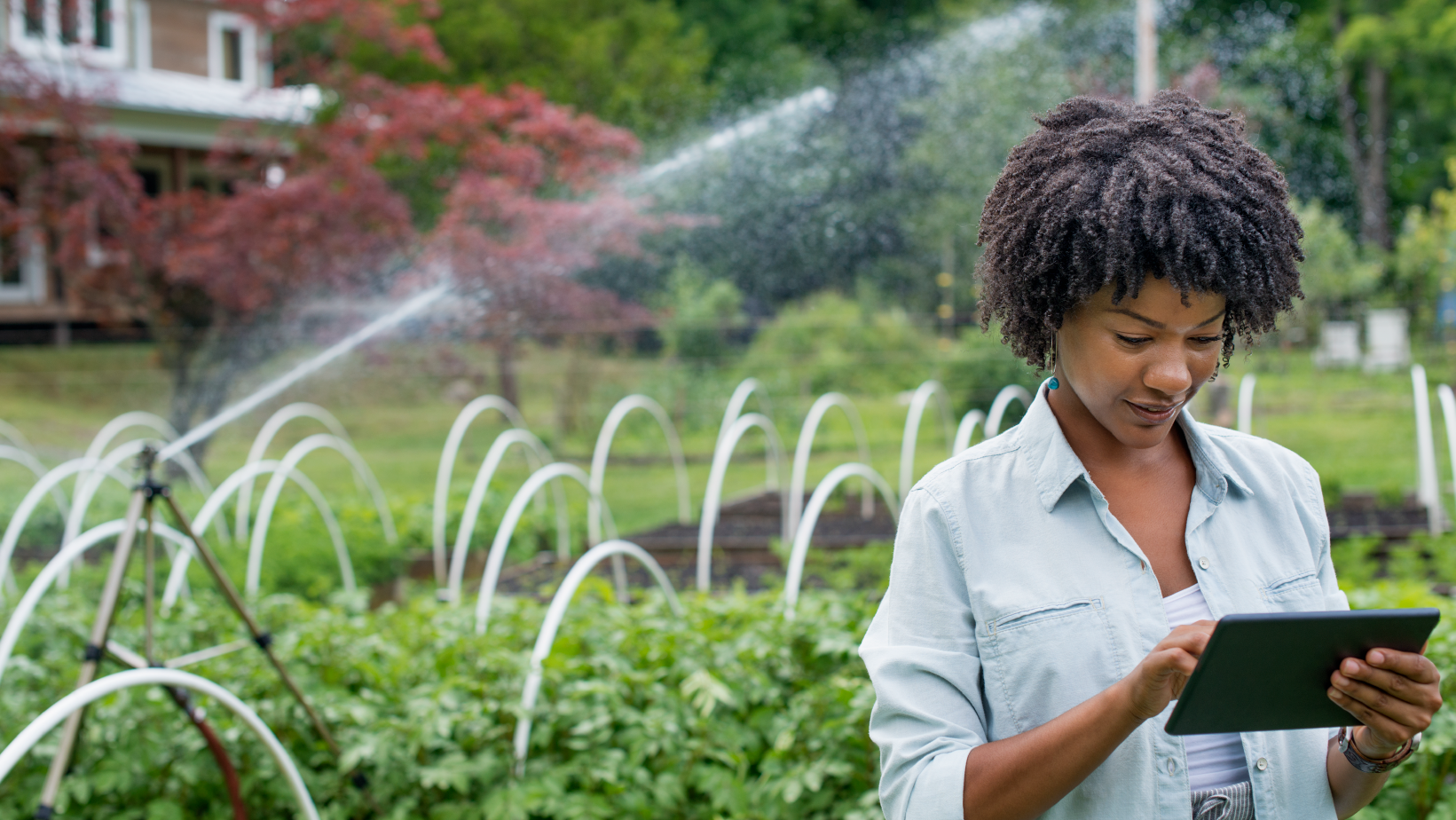Irrigation systems are key to keeping your lawn and gardens thriving all year round. But just having an irrigation system isn’t guaranteed to get you the best results for your plants. Even the best irrigation systems can use some adjustment. Regular maintenance and protective measures are also required to keep your irrigation system running strong. Here at the Irrigation Shop, we pride ourselves on giving our customers the best advice for caring for their irrigation system. We’ve created this handy guide on how to improve the efficiency and longevity of an irrigation system, so you can keep your plants well watered all year round.
Improving the Efficiency of Your Irrigation System

There are a number of ways you can go about improving irrigation system efficiency.
Control Your Watering Schedule
There are two types of devices that you can use to control when your irrigation system activates.
The first type are tap timers. Tap timers are simple battery-operated devices that are attached to individual outdoor faucets or taps. They control the flow of water to a single hose or irrigation line. Tap timers are primarily used for smaller areas or specific plants and can be set to turn on and off at specified intervals. When using tap timers, you should generally set them to water during the early morning. This reduces water loss due to evaporation and ensures that plants have access to water during the heat of the day.
The second type are irrigation controls. Irrigation controls are more advanced than tap timers. They are designed to manage the entire irrigation system, including multiple zones, valves, and various types of watering methods. They allow for precise control over the timing, frequency, and duration of watering for different areas of your landscape. Irrigation controls can integrate soil moisture sensors and rain sensors to ensure that the system only activates when plants aren’t receiving enough water.
Watch this video to see which is more suited for your system:
If you’re thinking of installing timers, sensors, or irrigation controls in your irrigation system you can check out our range of them here.
Drip Irrigation
Depending on your garden and lawn, you can also consider installing a drip irrigation system instead of using traditional sprinklers. Drip irrigation delivers water directly to the root zone of plants, minimising water wastage due to evaporation or runoff.
Mulching
For garden beds, you can apply a layer of mulch around plants to reduce evaporation, control soil temperature, and inhibit weed growth. This helps retain soil moisture and reduces the need for frequent watering.
Pressure Regulation
You can install pressure-regulating devices to maintain consistent water pressure throughout the system. This ensures that each emitter or sprinkler operates at its designed efficiency.
Zone Planning
You can also divide your garden into irrigation zones based on plant types, sun exposure, and water requirements. This allows you to water each zone appropriately, avoiding overwatering some areas and underwatering others.
Irrigation Maintenance Tips
Regularly maintaining your irrigation system ensures that it will continue to run at peak efficiency for many years to come. There are a few things that you should regularly be doing:

Faucet-Mounted Filters
These filters attach directly to the end of the faucet. They are easy to install and suitable for renters or anyone who doesn't want to make permanent changes to the plumbing.

Regular Inspections:
Check your irrigation system at least once a month, especially during the growing season. Look for leaks, damaged pipes, clogged nozzles, and other issues.

Clean Filters
Countertop filters sit on the kitchen counter and are connected to the faucet with a hose or diverter valve. They are easily portable and do not require any permanent modifications to the plumbing.

Clear Debris
Remove debris like leaves, sticks, and dirt from the sprinkler heads, nozzles, and drip emitters to ensure proper water distribution.

Adjust Sprinkler Heads
Make sure your sprinkler heads are adjusted properly to avoid overspray onto sidewalks, driveways, and buildings. This will prevent water wastage and potential damage.

Monitor Water Pressure
Irrigation systems require the right water pressure to work efficiently. Too much pressure can cause leaks, while too little can result in ineffective watering. Use a pressure gauge to measure and adjust pressure as needed.

Maintain Timers
If your system is automated, regularly check and update the irrigation timer settings based on the changing seasons. Adjust the watering frequency and duration as needed.

Winterize the System
Before winter, drain the water from the system to prevent freezing and damage. If you live in a cold climate, you might need to use compressed air to blow out any remaining water from the pipes.
Protecting Your Irrigation System

They say that prevention is the best cure and when it comes to irrigation systems, this is definitely true. Protecting your irrigation system from damage and wear and tear is the best way to cut down on maintenance and repair time and costs:
Use Durable Materials
This may seem self-explanatory but using durable materials will save you money and time in the long term. While you might save on money by using cheaper and less durable materials in the short term, you’ll spend a lot more time and money keeping the system up and running down the track. Your irrigation system should be made of parts that can withstand UV exposure and outdoor conditions. Even something as simple as using steel cobra clips over plastic cobra clips can save you a lot of time:
Dog Proof Your Irrigation System
If you have an above ground irrigation system and own dogs or other pets that often dig or chew on objects, you should consider erecting physical barriers around your system to prevent them from damaging it.
Insect Proof Your Irrigation System
Insects can easily cause internal damage to your irrigation system if it is unsealed. Ants in particular can cause irreparable damage to irrigation controls:
To prevent damage, you should ensure that all of your electrical components are either sealed or protected using durable coverings. We have a range of sealants for our irrigation system available at our store.
Backflow Prevention
You should install backflow preventers to ensure that contaminated water from the irrigation system does not flow back into the main water supply, protecting both your irrigation system and the drinking water.
Talk to the Irrigation Experts at The Irrigation Shop
If you’re ready to give your irrigation system an upgrade, you can shop our full range of irrigation system products here. If you need advice on anything Irrigation system related, you can either contact us online or visit us in-store.


Faucet-Mounted Filters
These filters attach directly to the end of the faucet. They are easy to install and suitable for renters or anyone who doesn't want to make permanent changes to the plumbing.

12 Volt Battery Sprayers
For those who wish to completely eliminate manual pumping, 12-volt battery sprayers are a dream come true. They maintain consistent pressure, ensuring that the spray's strength doesn't diminish over time, which is often a problem with manual sprayers. If you have an extensive area to cover or if you spray regularly, a 12-volt battery sprayer would be a worthy investment.

Chemical Pumps
Chemical pumps, or chemical sprayers, are designed to spray out more corrosive substances like pesticides, herbicides, or fertilizers. They usually come with durable seals and gaskets to resist chemical damage. If your garden requires regular application of such substances, investing in a chemical pump is advisable.

Regular Inspections
Check your irrigation system at least once a month, especially during the growing season. Look for leaks, damaged pipes, clogged nozzles, and other issues.

Clean Filters
Countertop filters sit on the kitchen counter and are connected to the faucet with a hose or diverter valve. They are easily portable and do not require any permanent modifications to the plumbing.

Clear Debris
Remove debris like leaves, sticks, and dirt from the sprinkler heads, nozzles, and drip emitters to ensure proper water distribution.

Adjust Sprinkler Heads
Make sure your sprinkler heads are adjusted properly to avoid overspray onto sidewalks, driveways, and buildings. This will prevent water wastage and potential damage.

Monitor Water Pressure
Irrigation systems require the right water pressure to work efficiently. Too much pressure can cause leaks, while too little can result in ineffective watering. Use a pressure gauge to measure and adjust pressure as needed.

Maintain Timers
If your system is automated, regularly check and update the irrigation timer settings based on the changing seasons. Adjust the watering frequency and duration as needed.

Winterize the System
Before winter, drain the water from the system to prevent freezing and damage. If you live in a cold climate, you might need to use compressed air to blow out any remaining water from the pipes.
Protecting Your Irrigation System

They say that prevention is the best cure and when it comes to irrigation systems, this is definitely true. Protecting your irrigation system from damage and wear and tear is the best way to cut down on maintenance and repair time and costs:
Use Durable Materials
This may seem self-explanatory but using durable materials will save you money and time in the long term. While you might save on money by using cheaper and less durable materials in the short term, you’ll spend a lot more time and money keeping the system up and running down the track. Your irrigation system should be made of parts that can withstand UV exposure and outdoor conditions. Even something as simple as using steel cobra clips over plastic cobra clips can save you a lot of time:
Dog Proof Your Irrigation System
If you have an above ground irrigation system and own dogs or other pets that often dig or chew on objects, you should consider erecting physical barriers around your system to prevent them from damaging it.
Insect Proof Your Irrigation System
Insects can easily cause internal damage to your irrigation system if it is unsealed. Ants in particular can cause irreparable damage to irrigation controls:
To prevent damage, you should ensure that all of your electrical components are either sealed or protected using durable coverings. We have a range of sealants for our irrigation system available at our store.
Backflow Prevention
You should install backflow preventers to ensure that contaminated water from the irrigation system does not flow back into the main water supply, protecting both your irrigation system and the drinking water.
Talk to the Irrigation Experts at The Irrigation Shop
If you’re ready to give your irrigation system an upgrade, you can shop our full range of irrigation system products here. If you need advice on anything Irrigation system related, you can either contact us online or visit us in-store.



